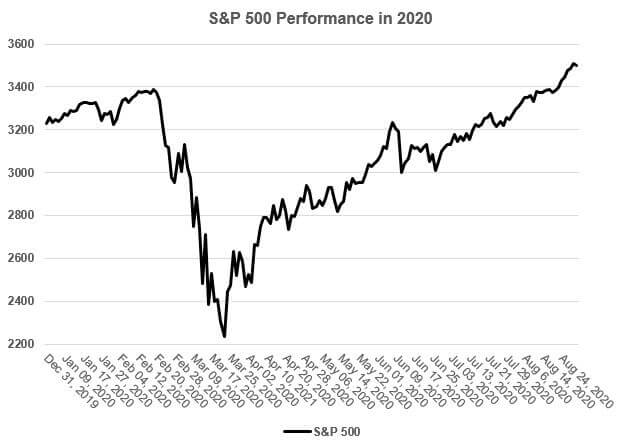The main US stock market index hit several new all-time highs in August.
So far, the US has had a difficult 2020:
- Its performance in the battle against Covid-19 has been widely criticised. In the first part of August the country was still experiencing around 50,000 new cases each day.
- In the second quarter of the year, the economy shrank at an annualised rate of 32.9% (i.e. 9.5% across the quarter), following a 5.0% shrinkage (1.3%) in the first quarter.
- Unemployment in July was running at 10.2%.
- A political logjam in Congress has prevented a second round of financial stimulus, the first round having expired at the end of July.
Despite these headwinds, the main US stock market index, the S&P 500, reached several new highs in August, having risen more than 50% from the low that it plumbed on 23 March 2020 as the pandemic took hold.
On the face of it, the new Wall Street high looks seriously out of sync with life on the ground in Main Street, USA. However, there is some logic in the market’s performance:
- Wall Street is not Main Street. In particular, the performance of the S&P 500 has been driven by a quintet of huge multinational technology companies – Apple, Microsoft, Amazon, Facebook and Alphabet (Google’s holding company). Together, these five companies account for just under a quarter of the value of the index.
- Interest rates have fallen. US interest rates have dropped sharply since the start of the year; the 10-year government bonds now offer an annual return of around 0.7%. As interest rates fall, in theory share prices should rise because a low discount rate is applied to value future profits. For income seekers, the S&P 500’s dividend yield of around 1.72% could seem relatively attractive.
- The market looks forward, not back. Economic data is about the past, but investment is about the future. Investors are considering how US companies’ profits will develop from here. As lockdowns and other restrictions are eased, an inbuilt recovery is expected.
Similar arguments apply in other markets: the best investors, like the best drivers, look and think ahead.
The value of your investment and the income from it can go down as well as up and you may not get back the full amount you invested. Past performance is not a reliable indicator of future performance.
The value of tax reliefs depends on your individual circumstances. Tax laws can change.
The Financial Conduct Authority does not regulate tax advice.
Content correct at time of writing and is intended for general information only and should not be construed as advice.

